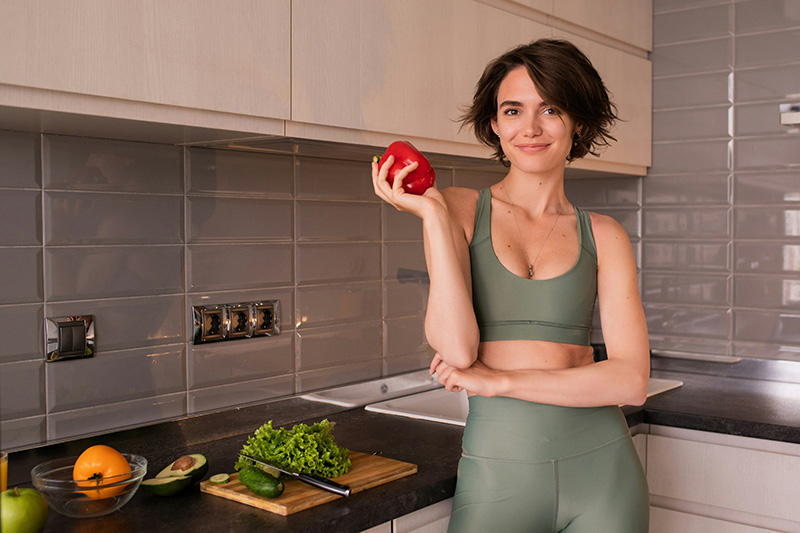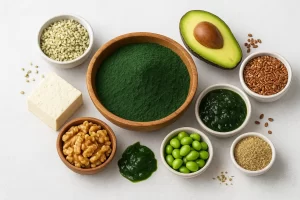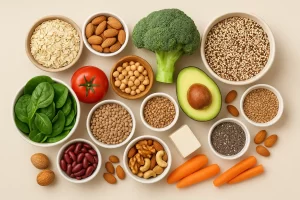If you’re following a plant-based diet, you’ve probably heard the same question more times than you can count: “But where do you get your B12?” While this might feel like a tired conversation starter at family dinners, there’s actually solid reasoning behind the concern. Vitamin B12 is one nutrient that truly deserves attention when you’re eating vegan.
Here’s the truth: B12 deficiency can sneak up on you. The symptoms often appear gradually – maybe you’re feeling more tired than usual, or your memory seems a bit foggy. For women especially, maintaining adequate B12 levels is crucial for everything from energy production to hormonal balance.
Why B12 Matters More Than You Think
Vitamin B12, also known as cobalamin, plays several critical roles in your body. It helps create red blood cells, supports your nervous system, and assists in DNA synthesis. For women of childbearing age, it’s particularly important – B12 deficiency during pregnancy can lead to serious developmental issues for the baby.
The challenge? Unlike most vitamins, B12 isn’t naturally found in plant foods. It’s produced by bacteria in soil and water, and animals get it by consuming these bacteria. Since we wash our produce thoroughly (as we should), we need to find reliable B12 sources elsewhere.
How Much B12 Do You Actually Need?
According to the National Institutes of Health, adult women need approximately 2.4 micrograms of B12 daily. However, this requirement increases during pregnancy to 2.6 mcg and during breastfeeding to 2.8 mcg.
Here’s something interesting: your body doesn’t absorb B12 with perfect efficiency. You might need to consume more than the recommended amount to ensure adequate absorption. This is especially true as we age – women over 50 often have reduced stomach acid, which makes B12 absorption more challenging.
Signs You Might Be Low on B12
B12 deficiency doesn’t happen overnight. Your liver stores several years’ worth of B12, which means symptoms can take time to appear. Watch for these warning signs:
- Persistent fatigue that doesn’t improve with rest
- Brain fog or difficulty concentrating
- Mood changes including depression or irritability
- Tingling sensations in hands and feet
- Pale or yellowish skin
- Balance problems or difficulty walking
If you’re experiencing any of these symptoms, it’s worth getting your B12 levels checked. A simple blood test can tell you where you stand. Don’t wait for severe symptoms to appear – by that point, you may have already experienced nerve damage that could be permanent.
The Best B12 Sources for Vegans
Fortified Foods
Many plant-based foods are fortified with B12. These include nutritional yeast (the cheesy-tasting flakes many vegans love), plant milks, breakfast cereals, and meat alternatives. Check the nutrition labels carefully – fortification levels vary widely between brands.
One tablespoon of nutritional yeast can provide 150-600% of your daily B12 needs, depending on the brand. It’s delicious sprinkled on popcorn, mixed into pasta dishes, or blended into creamy sauces.
Supplements
Most nutrition experts agree that supplements are the most reliable way to ensure adequate B12 intake on a vegan diet. You have several options:
Cyanocobalamin vs. Methylcobalamin: These are the two main forms of B12 supplements. Cyanocobalamin is synthetic, more stable, and less expensive. Methylcobalamin is the active form your body uses directly. Both work well, though cyanocobalamin has more research supporting its effectiveness.
Dosage matters: Because B12 absorption decreases as dosage increases, you’ll need different amounts depending on how often you supplement. Taking 50-100 mcg daily provides similar results to taking 2000 mcg weekly.
Looking for quality B12 supplements? Check out our curated selection of vegan B12 supplements on sale – we update these deals daily to help you save money while staying healthy.
What About Spirulina and Other “Natural” Sources?
You might have heard that certain algae, fermented foods, or unwashed organic vegetables contain B12. Here’s the reality: these sources contain B12 analogues – compounds that look like B12 but don’t function the same way in your body. In fact, these analogues can actually interfere with true B12 absorption.
Research published in the Journal of Agricultural and Food Chemistry confirms that plant foods like spirulina, nori, and chlorella don’t provide bioavailable B12 that humans can use effectively. Don’t rely on these as your primary B12 source.
Testing Your B12 Levels
If you’ve been vegan for more than a year, it’s smart to get your B12 levels tested. Ask your doctor for a complete B12 panel that includes:
- Serum B12: Measures total B12 in your blood
- Methylmalonic acid (MMA): More sensitive indicator of functional B12 status
- Homocysteine: Elevated levels can indicate B12 deficiency
Standard serum B12 tests can sometimes show normal levels even when you’re functionally deficient. The MMA test is considered more accurate for detecting true B12 status.
Special Considerations for Women
During Menstruation
Heavy menstrual bleeding can lead to iron deficiency, which often occurs alongside B12 deficiency. If you experience heavy periods, you might want to monitor both nutrients closely. For more information about managing iron levels on a vegan diet, check out our comprehensive guide to essential nutrients for vegan women.
Birth Control and B12
Some studies suggest that oral contraceptives might lower B12 levels. According to research from the American Journal of Clinical Nutrition, women taking birth control pills may need higher B12 intake to maintain optimal levels.
Pregnancy and Breastfeeding
This cannot be stressed enough: adequate B12 during pregnancy and breastfeeding is absolutely critical. Low maternal B12 can cause irreversible neurological damage in infants. If you’re pregnant, planning pregnancy, or breastfeeding, work closely with your healthcare provider to ensure your B12 levels are optimal.
Making B12 Supplementation Easy
Here’s a simple strategy that works for most people: take a daily B12 supplement with breakfast. Set a phone reminder if needed. Keep your supplements visible – next to your coffee maker, by your toothbrush, wherever you’ll see them every morning.
Some people prefer sublingual (under the tongue) tablets, which dissolve quickly and may improve absorption. Others like the convenience of a weekly high-dose tablet. Both approaches work well – choose what fits your lifestyle best.
Common B12 Myths Debunked
Myth: “I feel fine, so I don’t need to worry about B12.”
Reality: By the time symptoms appear, you may already have nerve damage. Prevention is key.
Myth: “B12 supplements are only necessary for long-term vegans.”
Reality: While your body stores B12, it’s better to maintain optimal levels from day one rather than waiting for stores to deplete.
Myth: “You can’t take too much B12.”
Reality: While B12 is generally safe even at high doses, it’s still best to follow recommended guidelines and work with a healthcare provider.
The Bottom Line
Getting enough B12 on a vegan diet isn’t complicated, but it does require attention. The good news? Once you establish a routine – whether through fortified foods, daily supplements, or weekly high-dose tablets – maintaining adequate B12 becomes second nature.
Don’t let B12 concerns hold you back from enjoying the many benefits of plant-based eating. With proper supplementation and occasional monitoring, you can thrive on a vegan diet while maintaining optimal B12 levels.
Ready to stock up on quality B12 supplements? Browse our selection of today’s best deals on vegan supplements and save money while investing in your health.
Disclaimer: This article is for informational purposes only and should not replace professional medical advice. Always consult with a qualified healthcare provider before starting any new supplement regimen, especially if you’re pregnant, breastfeeding, or have existing health conditions.
References:
- National Institutes of Health – Office of Dietary Supplements: Vitamin B12 Fact Sheet
- Vegan Health: Vitamin B12: Are You Getting It?
- American Journal of Clinical Nutrition – Research on B12 and oral contraceptives
- Journal of Agricultural and Food Chemistry – Studies on B12 content in plant foods



